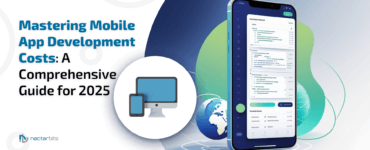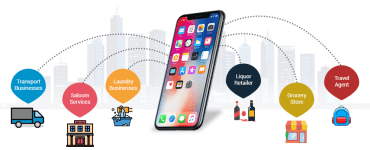The mobile app is an unignorable catalyst in the success reaction that accelerates the business growth, and if not added, the business survival will be hazy. The digital need is acceptable to a great extent, but starting a mobile-centered business is not a work of an average Joe.
There are myriad questions, concerns, and doubts that pops-ups in the entrepreneur’s mind which further muddy the water. Going mobile by jumping on the Android vs iOS bandwagon is one of the most important decisions that entrepreneurs have to take. Both of the platforms are dominating the mobile market with significant share and meeting various needs of the businesses through geography penetration, user demographics, and usage.
Here, the entrepreneurs are left with two choices- either they move into Android orbit or iOS orbit that will decide the business fate. Before this, it affects the budget, project timeline, and revenue goal. So, declaring a winner in the tug of war between iOS and Android should be based on facts.
We have compiled a list of factors that help you know which platform allows you to meet the mobile-first objective in the best possible way:
Target audience
The cheap price is the biggest business advantage to Android OS which has resulted in a market flooded with cost-effective Android phones and enabled Android to win the lion’s share of the market, that’s around 74.5%. On the other hand, iOS has managed to gain 22.85%, and the Windows and Samsung OS’s woes are deepening with just 2% of market share.

When the usage statistics are assessed under the market share of every platform, the things appear quite different. Android is more dominant in geographical areas such as Africa, Latin America, and Asia, while iOS OS is getting more popularity in Western Europe, Australia, North America.
IOS users are more affluent, young generation falling in the range of 18-24, mostly in managerial jobs, and earn and spend more on apps as opposed to Android users are generation Y & Z and in technical jobs with lower wages that spend less on the apps (Prefer free apps).
The result: Android vs iOS
When you are targeting the global market or developing nations where low-income users are found, then Android is a good idea. But, remember, the Android market is highly competitive with the sea of apps, which means you have to spend bundles on app promotion. On the flip side, iOS is the best bet to place when you are targeting North America, Australia, and Western Europe.

Budget and timeline for Android vs iOS
The number of devices, language compatibility, coding complexity, and interface guidelines play a vital role in defining how quickly the app can be developed in a comparatively lesser budget.
Both platforms vary greatly in terms of development complexity. For instance, Android suffers from device fragmentation issues (24,000 Android devices globally) and uses Java language to build the app, which means skilled developers are required. Additionally, Google provided design principles that are not required to be strictly followed other than basic guidelines, but a large number of different screen sizes doubles up the designers’ work to craft the interface that works flawlessly on all the devices.
On the other side, Apple devices are limited in number (Around 20 types of devices) and less complex language- swift is used for programming that makes it easier for developers and designers to engineer the app for fewer screens. This is why iOS app development takes 40% less time than Android app development incurs, and so will be the budget impacted
The result: When you want to build the app at speed and in an inexpensive way, iOS is the ideal choice that brings even revenue in abundance.
Robust security for Android vs iOS
From the inception, iOS OS is very particular about quality, reliability, and security that it offers to the users with its range of devices. iOS apps are no exception. The platform is also theft-proof as Apple has enforced strict guidelines during the app submission to protect the user’s security and privacy. Unless the app doesn’t pass the app store regulations, it cannot be accepted, the developers have to iterate it, to make the app fit into the Apple rules.
On the other hand, the Android platform is packed with a lot of security pitfalls due to lack of standardization, that’s why anyone can easily put a dent in the app’s security layer. When you are developing banking and finance apps, iOS is second-to-none.
The result: The iOS platform wins Android by a large fraction in terms of security.
The degree of customization
IOS platform provides a bunch of readymade tools, frameworks, interface models, and functional modules that allows the developers to effortlessly build the app with limited resources. However, anything can’t be built on the iOS platform because of the limited development toolsets and strict guidelines.
Android platform is open that allows the developers to follow the basic principles and rest is open for innovation. Besides, the developers can play around functionalities with endless UI & UX customization and can use the frameworks or plugins built by community members.
The result: When the app requires high-end customization and a touch of creativity, going ahead with the Android platform is better.
OS updation rates
Android users are less affluent and professional as opposed to iOS users. That’s why Android users are a little slower in OS updation, which makes things trickier for the developers.
The Android developers have to build the app that’s compatible with the latest OS and works glitch-free on older OS versions as well to not lose the share of the audience using older OSs. Apple users are more likely to update their OS as soon as it’s released.
The result: IOS platform is good to go, in the event, the developer is building a modern product that’s using the capabilities of the latest OS.

App monetization on Android and iOS
The free apps paid apps, in-app purchases, in-app sponsorship, and white label solution are some of the monetization models that businesses use to generate revenue from the apps.
When we shed light on the revenue that both platforms generate: Android edge ahead of the iOS in terms of the number of downloads across the globe, but it’s not the case with the ROI that Android brings. According to app store reports for 2018, iOS excels in the market with $12 billion in revenue in quarter 3rd, 2018 as compared to Google play store that has generated $6.2 billion. This is due to the higher annual income of iOS users when compared with Android users.
Despite the wide gap in the total revenue earned by both app stores, some apps are performing very well on Android and iOS. Distinct monetization models work for the apps on different platforms such as:
Android users do not readily put a hole in their pockets for app downloading or in-app purchases. The best approach is to make the app available free to download and then earning through in-app advertisements. The users can be asked to get the ad-free experience by unlocking the premium version of the app.
IOS users willingly pay for the app to download or unlock special features with in-app purchases. The paid apps, in-app purchases, and in-app subscriptions work great with app development on the iOS platform.
The final decision for Android vs iOS
Of course, you are expecting a clear answer here. But, in the battle of two platforms, there is no one-size-fits-all solution. It depends on several factors. Let’s see how?
When your target audience is from developed nations and you are short on time to build and publish the app, then investing in iOS app development can help you generate high revenue and easily come in the sight of the target audience.
When the app is targeting the global audience, then the range of devices and the breadth of customization options available with the Android platform help in reaching out to the audience of different nations uniquely.
In the event, the business gets enough success with one platform, then extending the app to another platform is a good idea to make the app gain enough share of both of the app store followers.









